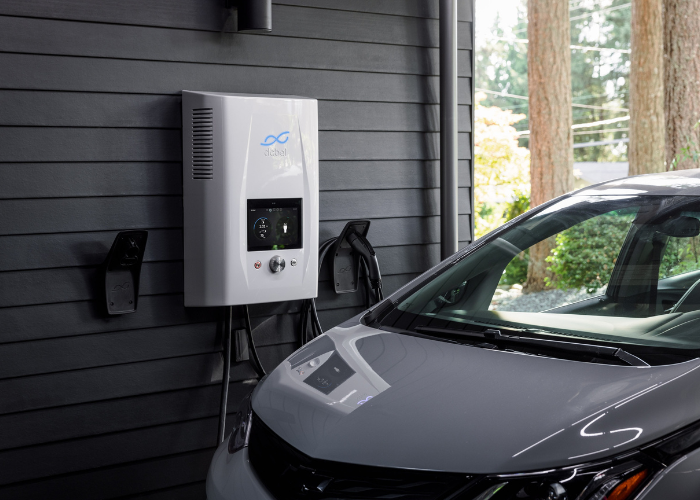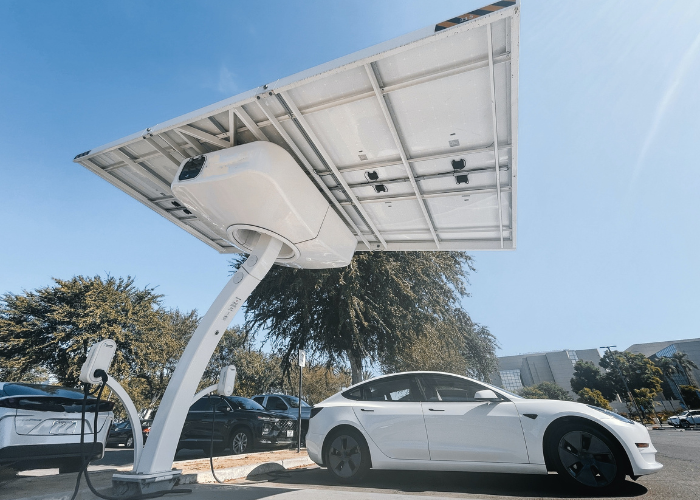The rising popularity of Electric Vehicles (EVs) has prompted an important question among prospective buyers: How does the cost of electricity compare to gasoline? With gasoline prices surging to over $5.00 per gallon in California, it's crucial to understand the financial implications of owning an EV. In this article, we'll examine the facts, data, and existing information to provide an insightful analysis of the cost comparison between fuel and electricity for EVs.
Fuel vs. Electricity Costs:
The cost of gasoline is subject to market fluctuations and geopolitical events, leading to unpredictable price variations. We see this currently in parts of California where gasoline is over $8 per gallon.
In contrast, the cost of electricity for EVs is relatively stable and dependent on the local electricity rates. According to the U.S. Department of Energy, the average cost of electricity per kilowatt-hour (kWh) in the United States is around $0.13. This does depend on where your electricity is coming from.

Fuel Efficiency and Range:
EVs tend to be more energy-efficient than traditional gasoline-powered vehicles. On average, EVs can travel around 4 miles or more per kWh. A gasoline vehicle generally achieves around 25-30 (depending on the vehicle) miles per gallon. This means EVs can travel a distance like gasoline vehicles while consuming significantly less energy.
Cost Savings:
Let's compare the cost savings of EVs against gasoline vehicles. Assuming an EV achieves 4 miles per kWh and an electricity rate of $0.13 per kWh, the cost to drive 100 miles would be approximately $3.25.
In contrast, a gasoline vehicle achieving 25 miles per gallon would require 4 gallons of fuel, costing over $20 in California at $5.00 per gallon. This showcases the potential for significant savings with electric power.

Additional Savings and Incentives:
The financial benefits of EV ownership don't stop at fuel costs. Many states offer incentives such as tax credits, rebates, and reduced registration fees for EV owners.
Moreover, maintenance costs for EVs are generally lower due to fewer moving parts and the absence of oil changes. These factors contribute to long-term savings for EV owners. Even when driving something as efficient as a Toyota Prius, ownership costs are significantly less with an EV.
Environmental Impact:
In addition to cost savings, EVs offer a cleaner and greener (depending on the battery type being used and how it is made) alternative to traditional gasoline vehicles. By shifting from gasoline to electricity, drivers can significantly reduce greenhouse gas emissions, contributing to a more sustainable future. The environmental benefits of EVs go hand in hand with the financial advantages, making them an attractive choice for eco-conscious consumers.
Evolving Infrastructure:
As the demand for EVs continues to grow, the charging infrastructure is rapidly expanding. Public charging stations are becoming more prevalent, allowing EV owners to charge conveniently while on the go. Additionally, many residential homes can now install home charging stations, providing owners with a convenient and cost-effective way to recharge their vehicles.
Conclusion:
In the debate between the cost of electricity and gasoline for EVs, the data and facts highlight the financial benefits of electric power. While gasoline prices can fluctuate and skyrocket, electricity costs for EVs remain relatively stable. Coupled with the inherent energy efficiency of EVs, the potential for long-term cost savings is significant. Beyond financial advantages, EVs contribute to a cleaner environment and offer additional incentives and reduced maintenance costs. As the charging infrastructure evolves, EV ownership becomes increasingly practical and accessible. With all these factors considered, it's clear that electric power is paving the way toward a sustainable and economically viable future for transportation.
Thank you for embarking on this journey with us. Together, let's continue exploring, discovering, and unlocking new horizons. Stay tuned for more captivating content to fuel your curiosity and inspire your imagination. We appreciate your readership and look forward to you joining us on our next adventure. Until then, keep dreaming, reading, and coming back for more!
A recent video tweet by a famous Tesla blogger from China claims that this new Tesla store in Chongqing, China, is the most excellent Tesla store in the world. The video of the store is going viral. The store, which is located in the Chongqing-JIEFANGBEI Starlight Plaza, features a 3D ground painting that combines the Tesla Gigafactory Shanghai and Chongqing landmarks.
Peter Neilson is an automotive consultant specializing in electric cars and hybrid battery technologies. He holds a Bachelor of Science in Automotive Service Technology from Weber State University. Peter can be reached on Linkedin and you can tweet him at The_hybrid_guy on Twitter. Find his page on Facebook at Certified Auto Consulting. Read more of Peter's stories at Toyota news coverage on Torque News. Search Toyota Prius Torque News for more in-depth Prius coverage from our reporter.
Set as google preferred source












Comments
Good story, Peter. I live in
Permalink
Good story, Peter. I live in Metro Boston, which embraced EVs from the get-go. We have full-service Tesla dealers in our state. They even get dealer plates for the test-drive vehicles. In this area, we have electricity from Eversource in many communities with a cost per kWh of around $0.35 if you opt-in to the discounted providers. Higher if you choose the green electricity option. Gas is about $3.30 right now here. So a gas SUV like a Forester has about the same cost per mile as an EV does. Hybrids like the Accord, Camry, Prius, Elantra, have a cost per mile for energy well below EVs. Making things harder, Eversource does not offer off-peak discounted EV charging rates (at night). Although the National averages definitely point to EVs being more affordable per mile, all that really matters is one's own local energy market. You are spot on about 4 miles/kWh being an EV average. However, I tested the Ford Lightning again recently, and my average for the week was 2.3 miles/kWh. And that was in conservative driving with moderate temps and no payload. With hydro maxed out, nat gas going ever higher in cost way above the inflation rate,and nukes now leaving the picture, electricity costs are having double-digit annual increases in this area. Yet the price of gas is relatively stable, and nowhere near its inflation-adjusted highs.
Hi Peter, thanks for the
Permalink
Hi Peter, thanks for the write up. It would also be great to see a cost comparison of a hybrid vs pure EV, say the Toyota Prius vs the Tesla Model 3.
I have a few suggestions regarding some of the numbers you've used. The average EV does not achieve 4 or more miles/kWh. The really efficient ones like the Model 3 do, but the average is closer to 3.5 miles/kWh. And due to charging losses, only about 90% of the electricity we pay for actually gets stored in the battery. So effectively, we get about 3.2 miles for every kWh we pay for on average.
The U.S. average price (May 2023) for electricity was $0.165/kWh and gasoline was $3.685/gallon. A higher gasoline cost and lower electricity cost are quoted as examples in the article, which make EVs seem a far better choice than they actually are.
Using these numbers, the cost per 100 miles comes out to $5.16 for EVs and $14.74 for gasoline vehicles. Still a pretty big difference.
If you’re going to use the
Permalink
If you’re going to use the cost of gasoline in CA as your base, shouldn’t you also use the real cost per Kilowatt in CA as well to get a real accurate comparison? In the summer we pay $.34 per kilowatt off peak and $.51 per kilowatt peak (4-9pm).
Where does the power to
Permalink
Where does the power to charge an EV come from? How much extra capacity does the electroc grid have? California constantly has rolling brown outs. How ling do batteries last and how much does it cost to replace them? What is the environmental impact of mining materials for batteries as well as disposal of spent batteries?